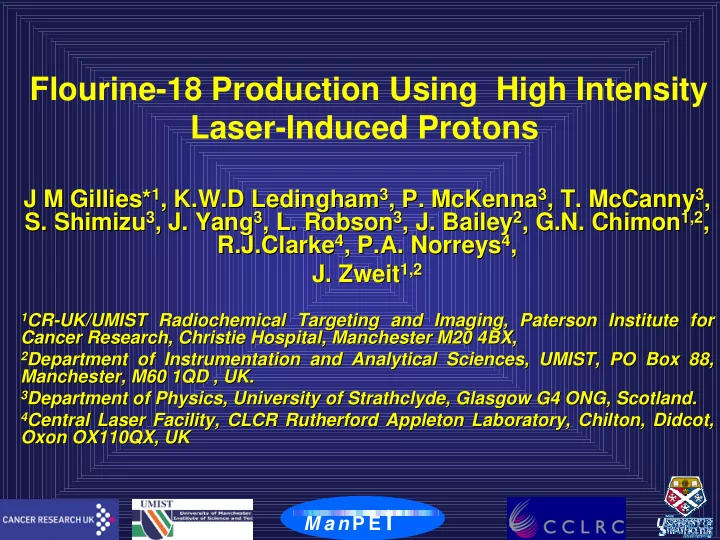

Flourine-18 Production Using High Intensity Laser-Induced Protons 1 , K.W.D Ledingham 3 , P. McKenna 3 , T. McCanny 3 , J M Gillies* 1 , K.W.D Ledingham 3 , P. McKenna 3 , T. McCanny 3 , J M Gillies* S. Shimizu 3 3 , J. Yang , J. Yang 3 3 , L. Robson , L. Robson 3 3 , J. Bailey , J. Bailey 2 2 , G.N. Chimon , G.N. Chimon 1,2 1,2 , , S. Shimizu 4 , P.A. Norreys 4 , R.J.Clarke 4 , P.A. Norreys 4 , R.J.Clarke J. Zweit 1,2 1,2 J. Zweit 1 CR 1 CR- -UK/UMIST Radiochemical Targeting and Imaging, Paterson Institute UK/UMIST Radiochemical Targeting and Imaging, Paterson Institute for for Cancer Research, Christie Hospital, Manchester M20 4BX, Cancer Research, Christie Hospital, Manchester M20 4BX, 2 2 Department of Instrumentation and Analytical Sciences, UMIST, PO Department of Instrumentation and Analytical Sciences, UMIST, PO Box 88, Box 88, Manchester, M60 1QD , UK. Manchester, M60 1QD , UK. 3 3 Department of Physics, University of Strathclyde, Glasgow G4 ONG Department of Physics, University of Strathclyde, Glasgow G4 ONG, Scotland. , Scotland. 4 Central Laser Facility, CLCR Rutherford Appleton Laboratory, Chi 4 Central Laser Facility, CLCR Rutherford Appleton Laboratory, Chilton, lton, Didcot Didcot, , Oxon OX110QX, UK Oxon OX110QX, UK M a n P E
Positron Emission Tomography Positron Emission Tomography Normally Cyclotron Produced Isotopes Normally Cyclotron Produced Isotopes 14 14 N (p,n) 11 11 C N (p,n) C 20 mins mins 20 α ) O(p, α 16 O(p, 13 N 16 ) 13 N 10 mins mins 10 15 N(p,n) 15 O 15 N(p,n) 15 O 2 mins mins 2 18 O(p,n) 18 F 18 O(p,n) 18 F 1.7 hours 1.7 hours
Laser Induced Protons for Isotope Production
Schematic of the Vulcan Petawatt Laser
Petawatt with Extensive Nuclear Shielding
Primary Proton Generation Target Primary Proton Generation Target • Aluminium, gold and mylar foil targets (high conductivity) of various thicknesses acted as the primary target. • Primary target irradiated by the laser beam incident at an angle of 45˚. • The protons emanated from water and hydrocarbon contamination layers on the primary target surfaces.
-up up Laser Target Set- Laser Target Set
Enriched Oxygen- -18 Housing 18 Housing Enriched Oxygen
µ Al target. proton spectra in front of and behind a 10 µ Al target. proton spectra in front of and behind a 10 The number of protons generated per laser shot at about 300J and 4x10 20 Wcm -2 was typically 10 12 .
Laser driven PET isotope production 100KBq F-18 Produced in 1.5mL [ 18 O]H 2 O enriched water from a single pulse of 750 fs (Isotope confirmed with gamma-ray spectroscopy)
[ 18 18 F]FDG Synthesis Using Laser Induced F 2- -[ F]FDG Synthesis Using Laser Induced F- -18 18 2
Laser driven F-18 isotope production Vulcan Petawatt Activity as function of laser intensity. The black hatched area is for typical patient dose for 18 F.
How can we increase the production to From KBq to MBq • Increase the energy per pulse to 1kJ or greater • Flux of proton energy • Use a table top laser and integrate over many pulses • Investigate targetry • collimation
Acknowledgements Acknowledgements • University of Manchester • Cancer Research-UK • UMIST
Recommend
More recommend